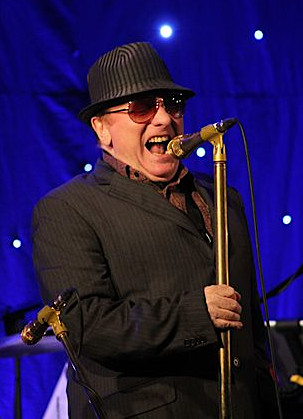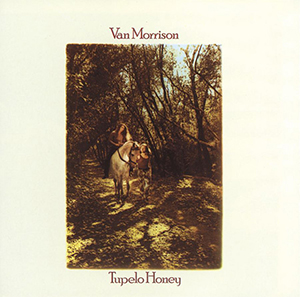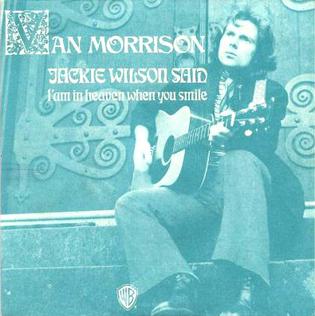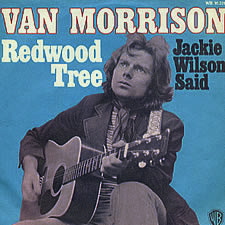
Sir George Ivan MorrisonOBE is a Northern Irish singer-songwriter and musician whose recording career started in the 1960s.

Moondance is the third studio album by Northern Irish singer-songwriter Van Morrison. It was released on 27 January 1970 by Warner Bros. Records. After the commercial failure of his first Warner Bros. album Astral Weeks (1968), Morrison moved to upstate New York with his wife and began writing songs for Moondance. There, he met the musicians who would record the album with him at New York City's A & R Studios in August and September 1969.

Tupelo Honey is the fifth studio album by Northern Irish singer-songwriter Van Morrison. It was released in October 1971 by Warner Bros. Records. Morrison had written all of the songs in Woodstock, New York, before his move to Marin County, California, except for "You're My Woman", which he wrote during the recording sessions. Recording began at the beginning of the second quarter of 1971 at Wally Heider Studios in San Francisco. Morrison moved to the Columbia Studios in May 1971 to complete the album.

One Man Dog is the fourth studio album by singer-songwriter James Taylor. Released on November 1, 1972, it features the hit "Don't Let Me Be Lonely Tonight", which peaked at number 14 on the Billboard charts on January 13, 1973. The follow-up single, "One Man Parade", also charted but less successfully, peaking at number 67 in the US and reaching number 55 on the Canadian Adult Contemporary chart. The basic tracks were primarily recorded in Taylor's home studio.

Magic Time is the thirty-first studio album by Van Morrison, released in 2005 by Geffen Records. It debuted at No. 25 on the US Billboard charts and No. 3 in the UK - Morrison's best UK chart debut until Still on Top – The Greatest Hits opened at No. 2 in 2007. Rolling Stone ranked 'Magic Time' seventeenth on The Top 50 Records of 2005.

His Band and the Street Choir is the fourth studio album by Northern Irish singer-songwriter Van Morrison. It was released in November 1970 by Warner Bros. Records. Originally titled Virgo's Fool, Street Choir was renamed by Warner Bros. without Morrison's consent. Recording began in early 1970 with a demo session in a small church in Woodstock, New York. Morrison booked the A&R Studios on 46th Street in New York City in the second quarter of 1970 to produce two sessions of songs that were released on His Band and the Street Choir.

Saint Dominic's Preview is the sixth studio album by Northern Irish singer-songwriter Van Morrison. It was released in July 1972 by Warner Bros. Records. Rolling Stone declared it "the best-produced, most ambitious Van Morrison record yet released."

Hard Nose the Highway is the seventh studio album by Northern Irish singer-songwriter Van Morrison, released in 1973. It is his first solo album since his 1967 debut Blowin' Your Mind! to contain songs not written by Morrison. A cover version of the song "Bein' Green", usually associated with Kermit the Frog, is included, as is a take of the traditional song "Purple Heather". The album also contains the single "Warm Love," a fan favourite.

Down the Road is the twenty-ninth studio album by Northern Irish singer Van Morrison. The album has a nostalgic tone, lyrically and musically, and its arrangements mix R&B and blues with country and folk, and, with a few exceptions, like "Georgia on My Mind," the music is most often rooted in 1950s and early 1960s popular music.
"Into the Mystic" is a song written by Northern Irish singer-songwriter Van Morrison and featured on his 1970 album Moondance. It was also included on Morrison's 1974 live album, It's Too Late to Stop Now.
"Caravan" is a song written by Northern Irish singer-songwriter Van Morrison and included on his 1970 album, Moondance. It was a concert highlight for several years and was included as one of the songs on Morrison's 1974 acclaimed live album, It's Too Late to Stop Now.
"Saint Dominic's Preview" is the title song of the sixth album by Northern Irish singer-songwriter Van Morrison, released in July 1972 by Warner Bros. It was recorded at the Wally Heider Studios in San Francisco in April 1972, with overdubs made later on. Morrison wrote it in a stream of consciousness in the same vein as some of his earlier works, particularly those on Astral Weeks. The song's narrative moves from France to San Francisco, Morrison's place of residence at the time, to Belfast, where he grew up, to New York City.
"Almost Independence Day" is the closing song on Northern Irish singer-songwriter Van Morrison's 1972 album Saint Dominic's Preview. The song is ten minutes long and features Morrison trading guitar licks with Ron Elliott.
"Listen to the Lion" is a song written by Northern Irish singer-songwriter Van Morrison and featured on his sixth album, Saint Dominic's Preview (1972). Its poetic musings and "bass-led shuffle" lead back to Astral Weeks territory.

"Jackie Wilson Said (I'm in Heaven When You Smile)" is a song written and performed by Van Morrison and featured as the opening track on his sixth studio album, Saint Dominic's Preview. It was released by Warner Bros. in July 1972 as the first of three singles from the album and charted at number sixty-one on the US Billboard Hot 100. Both the music and lyrics are inspired by rhythm and blues singer Jackie Wilson and his song "Reet Petite", which is directly quoted in the song.
"I Will Be There" is a song featured on Northern Irish singer/songwriter Van Morrison's sixth album Saint Dominic's Preview (1972). The song is also the B-side to Morrison's single "Warm Love", released in 1973.

"Redwood Tree" is the sixth song on Northern Irish singer-songwriter Van Morrison's 1972 album, Saint Dominic's Preview, released in July 1972 by Warner Bros. It was later released in October as the second of three singles from the album and charted at number 98 on the US Billboard Hot 100.
"Fair Play" is a song by Northern Irish artist Van Morrison. The opening track on the 1974 album Veedon Fleece, it derived its name from Morrison's Irish friend, Donall Corvin's repeated use of the Irish colloquialism "fair play to you" as a wry compliment. The 3/4 ballad references Irish city Killarney, and poets Oscar Wilde, Edgar Allan Poe and Henry David Thoreau, and according to Morrison, the song derived from "what was running through his head", and marked a return to the stream of consciousness channeled song-writing that had not been evident since several of the songs contained in his 1972 album Saint Dominic's Preview. "Fair Play" was included on the 2015 compilation The Essential Van Morrison.

"(Straight to Your Heart) Like a Cannonball" is a song written by Van Morrison that was first released on his 1971 album Tupelo Honey. It was also released as the third single from the album but did not chart.
"4% Pantomime" is a song written by Robbie Robertson and Van Morrison. It was first released on the Band's 1971 album Cahoots.












